A Tale of Two Chromebooks
- Paul Thurrott
- Jul 21, 2021
-
56

And not just any Chromebooks, but premium, business-class Chromebooks that speak volumes about how far this platform has come in recent years.
But first a digression, and a lengthy contextual one. After all, it’s been a while since I started thinking and writing anew about Chromebooks.
Windows Intelligence In Your Inbox
Sign up for our new free newsletter to get three time-saving tips each Friday — and get free copies of Paul Thurrott's Windows 11 and Windows 10 Field Guides (normally $9.99) as a special welcome gift!
"*" indicates required fields
How long? Well, the HP Elite c1030 Chromebook Enterprise arrived at my home in early December 2020, and the Lenovo ThinkPad C13 Yoga Chromebook Enterprise came almost three months later, in late February 2021. I move more slowly on hardware reviews than most, but those are lengthy timeframes, even by my standards. This is an issue I’ve been trying to rectify in 2021, and I’m now keeping track of which laptops are in for review, including when they arrived so that I can ensure I’m not too far behind.
And as of this writing, I’m in a pretty good place: My next laptop review will be the Lenovo ThinkBook 15 Gen 2, which arrived in mid-May, or about two months ago. (I’ve published that review since first writing this.) I’d like to cut that down to 6 weeks, if possible, and then to even less. But it’s heading in the right direction, and I’ve established a more formal process for dealing with these machines and the logistics of returning them once the review is complete. One day at a time.
Granted, I skipped over these two business-class Chromebooks to keep to this slightly quicker schedule. And doing so was not just about procrastination, though I’m sure that’s part of it. No, Chromebooks are tough for me. And business-class Chromebooks are even more so because they raise the bar, and the stakes.
My issues are a combination of platform limitations, my own deeply-ingrained workflows, which don’t always work well or at all on Chromebooks, and the expectations of this site’s largely Windows-focused readership. To that latter point, as a technology enthusiast, I don’t understand the derision that Chromebooks evoke in some otherwise like-minded circles, and I feel like my own fascination with this platform should be mirrored by others. Instead, it’s often met with outright hostility.
Chromebooks are only popular because they’re so inexpensive, I’m told. Or they’re only popular in education, or only in U.S. education. Or whatever. But I’ve been arguing for years that Chromebooks are a viable platform for many if not most mainstream users for very good reasons. Yes, they are typically less expensive. But that wouldn’t be enough if that’s all there was to it. Chromebooks are familiar but simpler than competing desktop platforms (a goal Microsoft is trying to accomplish with Windows 11, by the way). They’re much easier to manage and maintain, and that’s as true for individuals as it is for schools, businesses, and governmental organizations. They also provide a great apps experience between web and Android apps. And they’re the right kind of device for a world in which most people use their smartphones for most of their daily computing needs.
Regardless of your stance on all that, it’s hard to argue with the numbers. One out of every 10 PCs sold last year and in the first quarter of 2021 were Chromebooks, making this platform number two by volume, after Windows and, most crucially, ahead of the Mac: Apple sells about 7 Macs for every 10 Chromebooks sold. The COVID pandemic raised all boats in this market, but it raised Chromebook most of all: 2021 was the best year ever for this platform, and that success has continued into 2021.
But from a review perspective, Chromebooks are still problematic for me.
As a power user of sorts, I find myself constrained by its limitations, some of which are general and some of which are very specific. The most egregious is OneDrive local sync integration: I rely on this technology on the PCs I use every day, and it’s available in the exact same form on the Mac; where it’s not available is on Chrome OS, and this is a hard problem for me to get around. If I were serious about using a Chromebook, I’d have to switch to Google Drive, which offers similar capabilities in the Google ecosystem. I’m not interested in that. (This problem makes Linux usage problematic, too.)
Or would I? I guess the other option is to just adapt. While it’s not possible to sync OneDrive files locally on a Chromebook—well, without a third-party tool, which has performance and battery life issues—what you can do is add OneDrive to the Chrome OS Files app, and that lets you browse the contents of your OneDrive and open documents … in whatever programs Google allows. For Word documents, that means Google Docs on the web, and I can’t figure out a way to change that, even after installing the Office (Android) and Word (Android) apps, and the Office extension for Chrome, which provides yet another way to access my OneDrive-hosted documents. Sigh.
Just this one issue is worthy of an article series, and maybe I’ll get there. But for now, there are other issues too. On Windows (and, less often, the Mac), I use specific applications for writing (the desktop version of Word and a Markdown editor) and image editing (Paint, Affinity Photo), and not having them on other platforms slows me down and makes me less efficient; none of them are available on Chrome OS. I could use the web or Android versions of Word, of course, and have of course tried both, and there are various web- and even mobile-based Markdown editors. And there are web app replacements, of sorts, for the imaging editing applications, but none are ideal for my needs, and none bridges that local-file-to-cloud bridge as easily and seamlessly as the native OneDrive client on Windows.
And wow. I’ve already hit on a number of things that might halt the move to a Chromebook for some people, and there are so many more. So I do get it.
But I’m also not a Chromebook denier. I see the value of this platform, believe it will work fine for most people, and I would like to be able to adapt to it more ably. I don’t really expect Microsoft to help me, per se, with native versions of Word (let alone Paint) or OneDrive, of course. But it is what it is. I need to find workarounds or replacements for the tools I rely on every day when I turn to a Chromebook.
Millions of people have done this successfully, of course, but most don’t share my preferences or requirements. If you think about the typical OneDrive user, for example, it’s someone who fell into it because it came with Windows, or it was something their workplace requires. This is true on the Google side of the fence, as well: Those who pick Chromebook, perhaps because of its synergy with Android, will naturally drift into Google Drive (and other Google apps and services) usage.
There’s nothing wrong with any of that. But the problem with experience is that it ties you to the thing that is familiar, and it makes the unfamiliar and different less viable, and it gets worse over time. Many confuse this experience as “intuitive”—we see this light form of delusion a lot in the Mac community—but really, it’s just familiarity. Semantics aside, there is a very real efficiency that comes with familiarity, and so switching to something new can be difficult and painful. And so it is, for me, with Chrome OS and the Chromebooks on which it runs.
If all this sounds like a long-winded excuse for not formally reviewing the HP Elite c1030 Chromebook Enterprise and the Lenovo ThinkPad C13 Yoga Chromebook Enterprise, well, fair enough. I can’t argue with that. But what I can do, where my decades of laptop reviewing can at least shine a little bit of light, is examine these two premium alternative PCs and compare them to each other and to other similar Windows-based PCs. I have, after all, reviewed literally hundreds of computers over the years. Surely, there’s some takeaway here.
And there is.
With the Elite c1030 Chromebook Enterprise and the ThinkPad C13 Yoga Chromebook Enterprise, HP and Lenovo have collectively landed at the same conclusion after years of experimentation: It’s possible to sell an expensive, premium Chromebook for businesses and prosumers that doesn’t compromise on the quality offered by their other premium PCs while still providing customers with all of the advantages of this simpler, newer platform. In other words, Chrome OS isn’t just viable on low-end “stripper” PCs aimed at under-funded educational institutions or lower-income families who can’t afford a “real” computer. This platform has evolved to become quite powerful, and now the hardware on which it runs is evolving to match.
If the notion of buying a Chromebook that costs as much as a MacBook Air seems odd to you, I get that too. But surely the past year and a half has taught us the value of, if not embracing change, at least better handling change. It’s interesting what you can put up with when you put your mind to it. Plus, we need to let go of some out-of-date notions about this platform. Yes, it was once originally all about value and simplicity. That’s still there, but the Chromebook market has evolved. It’s more diverse now.
Just look at these two Chromebooks.

If you spied someone, perhaps on an airplane or train, or in a coffee shop or hotel lobby, using the Elite c1030 Chromebook Enterprise or the ThinkPad C13 Yoga Chromebook Enterprise, you probably wouldn’t even realize that the PCs are Chromebooks, unless you got up close and were already looking for the tell-tale Chromebook logo on the outer display lid. Both PCs are representative of HP’s and Lenovo’s premium portable PC families, and both fit in naturally alongside their Windows-based siblings.
That alone is kind of interesting, right? Chromebooks used to stand out in the same way that hybrid and then electric vehicles stood out. They were just off, somehow. Recognizable as PCs, in this case, yes. But … different. Cheaper looking. Usually smaller. And less versatile, with standard clamshell designs, rather than the convertible and 2-in-1 designs that are more common in the Windows PC space.
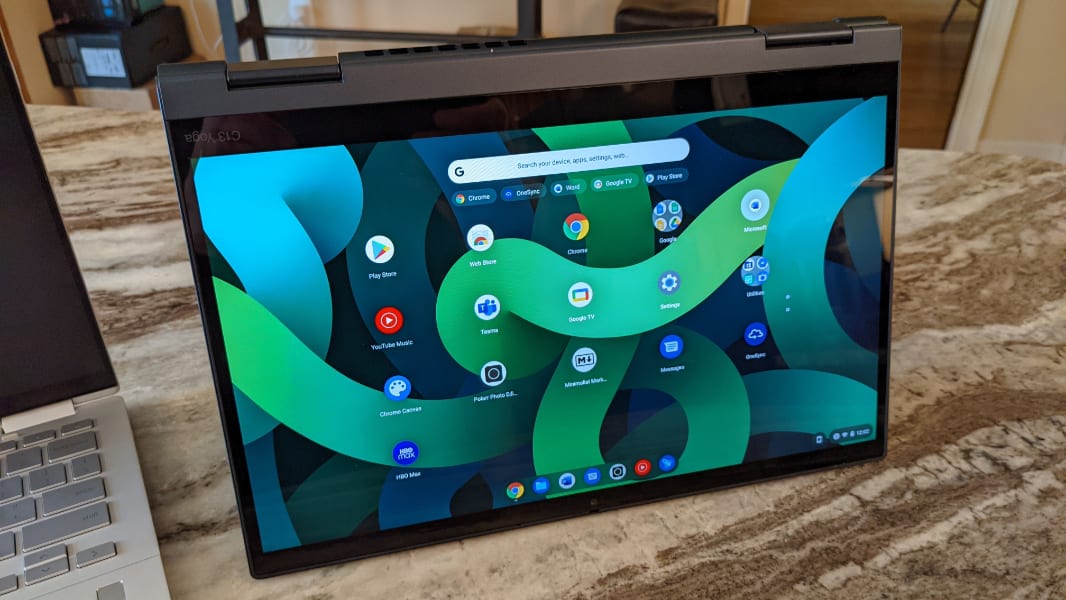
Well, not anymore. The Elite c1030 Chromebook Enterprise and the ThinkPad C13 Yoga Chromebook Enterprise are both convertible PCs that support multitouch and smartpens, and both can contort into other usage modes—-tablet, stand, presentation—just like modern Windows PCs. They’re both obviously premium PCs, built of premium materials like aluminum, and not plastic, and they both survive the kinds of MIL-SPEC durability tests that businesses require (and that schools should require, when you think about it).
From a specifications perspective, both Chromebooks are modern and powerful, and they have components that rival what we see in the premium PC space.
The HP Elite c1030 is powered by a quad-core 10th-generation Intel Core i5-1031OU or Core i7-10610U CPU with vPro management capabilities, 8 or 16 GB of RAM, and 128 or 256 GB of PCIe NVMe-based SSD storage.
The Lenovo ThinkPad C13 Yoga Chromebook veers off in an interesting and, to me, unfamiliar direction by opting for a choice of AMD Athlon Gold 3150C or AMD Ryzen 7 3700C processors, the former of which helps to really keep the starting price down. And then 8 or 16 GB of RAM and up to 256 GB of PCIe NVMe-based SSD storage.
The displays are suitably impressive as well. The HP provides an excellent 13.5-inch Full HD+ (1920 x 1280) IPS display panel with a 3:2 aspect ratio and glossy, anti-glare, and SureView Reflect Privacy options. And while the Lenovo opts for a more traditional 13.3-inch 16:9 panel, you at least can choose between Full HD (1920 x 1080) and 4K/UHD (3840 x 2160) resolutions; both of which are coated with either anti-glare or anti-reflective material.

Connectivity? Ditto, it’s modern: Wi-Fi 6 and Bluetooth 5 are available in both, and 4G/LTE cellular data capability is an option in the HP.
Expandability is likewise impressive. The HP, despite its thinness and lightness, provides a combo audio jack, a USB-C 3.2 port, a lock slot, power and volume buttons, and a webcam privacy switch on the left side. And a full-sized USB-A port, a USB-C 3.2 port, and a micro-SD card reader on the right.
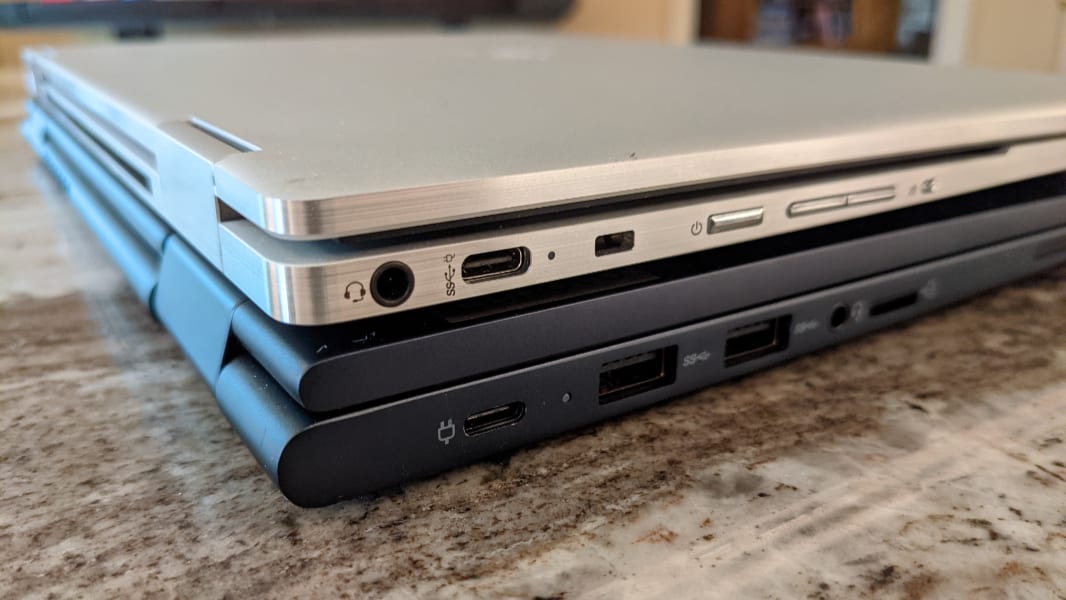
The Lenovo provides a USB-C 3.2 Gen 1 port, two USB-A 3.2 Gen 1 ports, a combo audio jack, and a micro-SD card reader on the left. And a lock slot, a USB-C 3.2 Gen 1 port, a full-sized HDMI 2.0 port, and power and volume buttons on the right.
In both cases, power arrives via a standard 65-watt USB-C-based power connector, the same connectors that HP and Lenovo use for their other premium PCs.
That both of these Chromebooks have excellent keyboards and touchpads is, perhaps, not surprising given their respective pedigrees, but it’s still quite welcome. As a writer, I spend entire days tapping away on keyboards, and HP and Lenovo make some of the best portable keyboards in the business. I happen to prefer HP over Lenovo these days—Lenovo still prefers longer key throws, and I find them a bit mushier—but both are excellent.
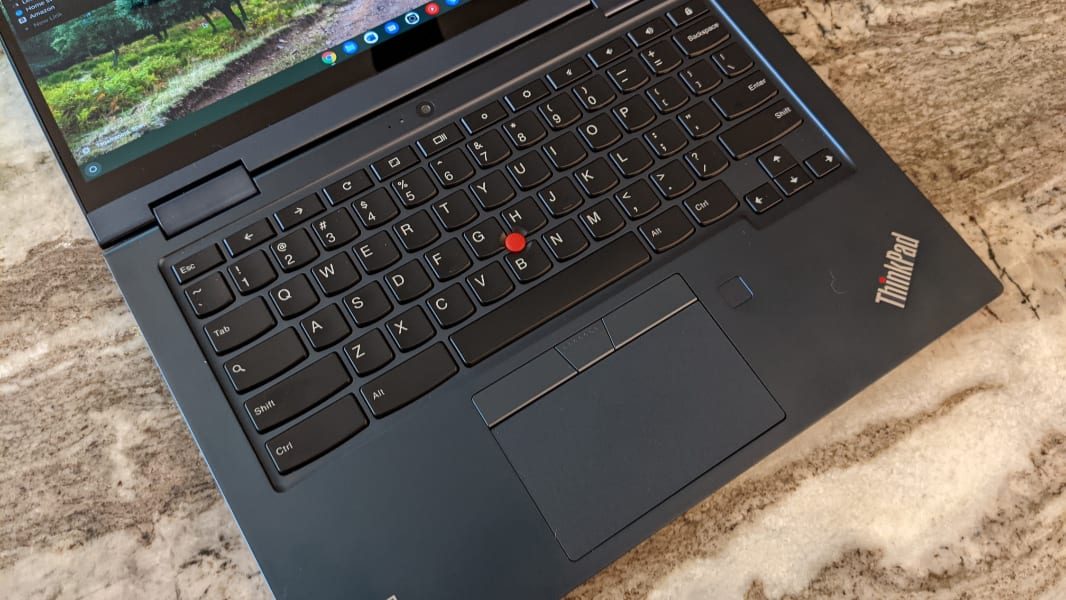
And of course the Lenovo offers the vaunted ThinkPad dual-pointing system with both a touchpad and the TrackPoint nubbin.
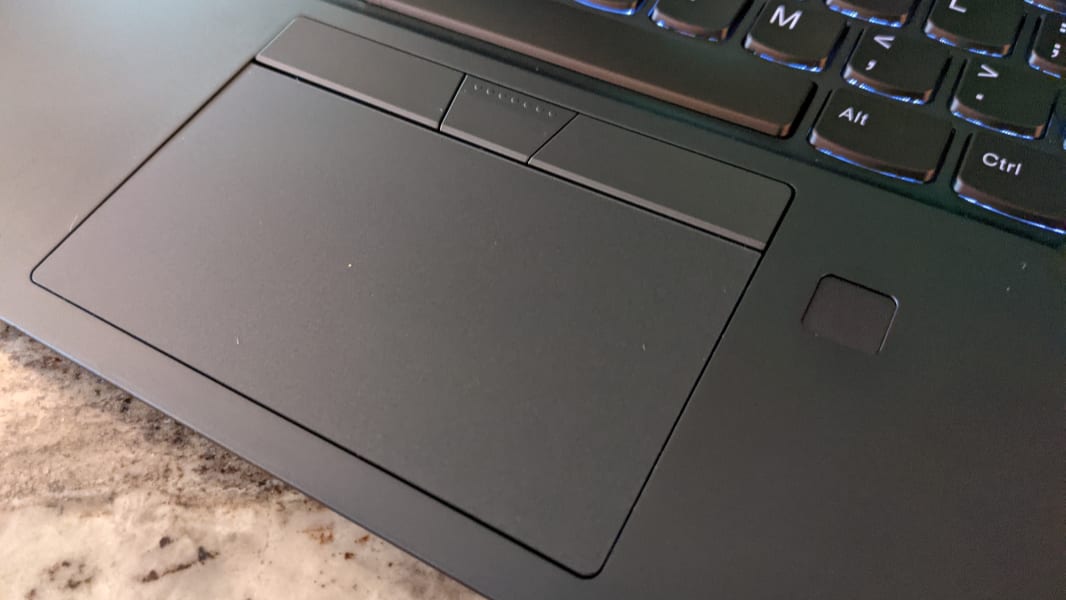
One more point about the keyboards. If you read any of my PC reviews, you may know that HP has been evolving its keyboard layouts and offers different designs on its 13.x- and 14-inch PCs. On Chromebooks, however, things are different. Google has standardized the keyboard layout for the most part, and so the only layout differences you will see are in the function row. But even then, the differences are minor: Both Chromebooks support the same keys in the same locations, but the HP has a few additional keys.

Given this, the differences boil down to the typing experience—key throw, key feel, and so on—and then the design. The HP has light gray colored keys with white backlighting, and the keys can be a bit hard to read when they’re lit.

But the Lenovo has black keys with white letters, and they’re easy to see when not lit. Overall, I prefer the look of the Lenovo but the feel of the HP.
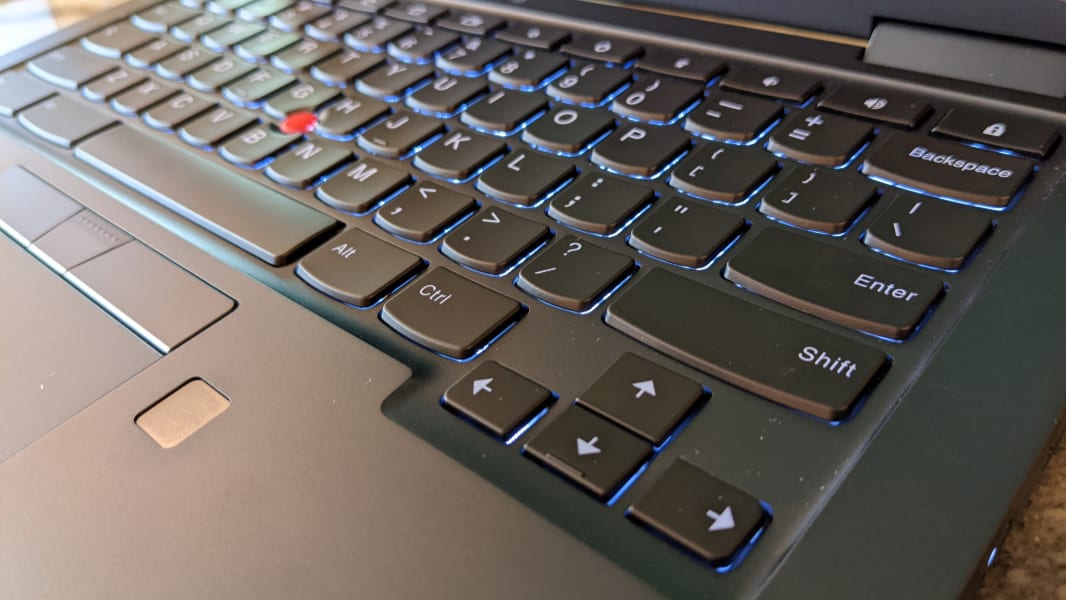
I apologize for not having any battery life observations. I’ve been using both Chromebooks around the house, and I’m not aware of any way to accurately measure battery life on this platform. But HP notes that the Elite c1030 gets “long battery life,” which is hilariously vague, and can Quick Charge to 90 percent in 90 minutes. The ThinkPad, by comparison, sees “all-day battery life,” or up to 12.5 hours with the Full HD-based versions, and it supports Rapid Charge to 80 percent in 60 minutes.
While the battery life is unclear, one of these Chromebooks has a decided portability advantage over the other: The HP is considerably less heavy, at 2.87 pounds, than the Lenovo, which weighs in at a noticeably heftier 3.3 pounds. The HP is also smaller, at 0.6 x 11.6 x 8.5-inches, compared to the Lenovo, at 0.61 x 12.11 x 8.35-inches. What’s odd about these numbers is that they seem close to each other on paper, but the HP is notably smaller and lighter in person. I would very much rather carry around the HP.
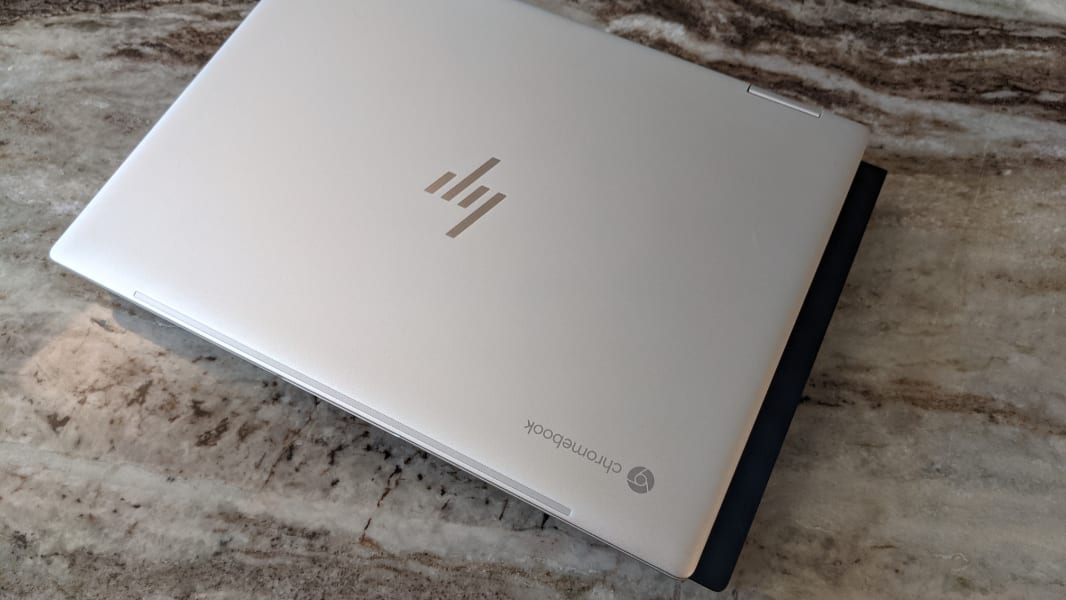
From an audio-visual perspective, both Chromebooks offer similar capabilities.
Each offers stereo sound, but neither is particularly impressive. I generally test sound on Windows-based PCs using movies streamed from Microsoft’s Movies & TV app and from YouTube Music on the web, but the former is unavailable on Chrome OS, so I watched bits of Atomic Blond using Google TV instead. (Thanks, Movies Anywhere.) On the HP, the volume levels are pretty low, despite the HP’s requisite Bang & Olufsen tuning, and even hitting 100 percent volume didn’t provide the oomph I was hoping for. The Lenovo is much louder, though the quality isn’t all that impressive. I’d call the audio performance serviceable in both cases.

Both Chromebooks offer a middling 720p webcam, pretty standard on the PC side of the fence as well, and the Lenovo can be configured with a second “world-facing” 5 MP webcam that’s oddly located above the keyboard; I guess you can only use it in tent mode. For what I don’t know. Both offer privacy switches for physically blocking the (front) camera. And both offer dual-array microphones for conference call clarity, but if you opt for the world-facing camera on the Lenovo, you only get a single microphone.

Both Chromebooks also provide wrist rest-based fingerprint readers, which is huge for this platform: Signing in, otherwise, can be a problem on Chromebooks since you have to type in your full password or use a 6-digit (as opposed to 4, as on every other platform on earth) PIN, or use the phone integration functionality to quickly finagle a sign-in that way, which I find unreliable.
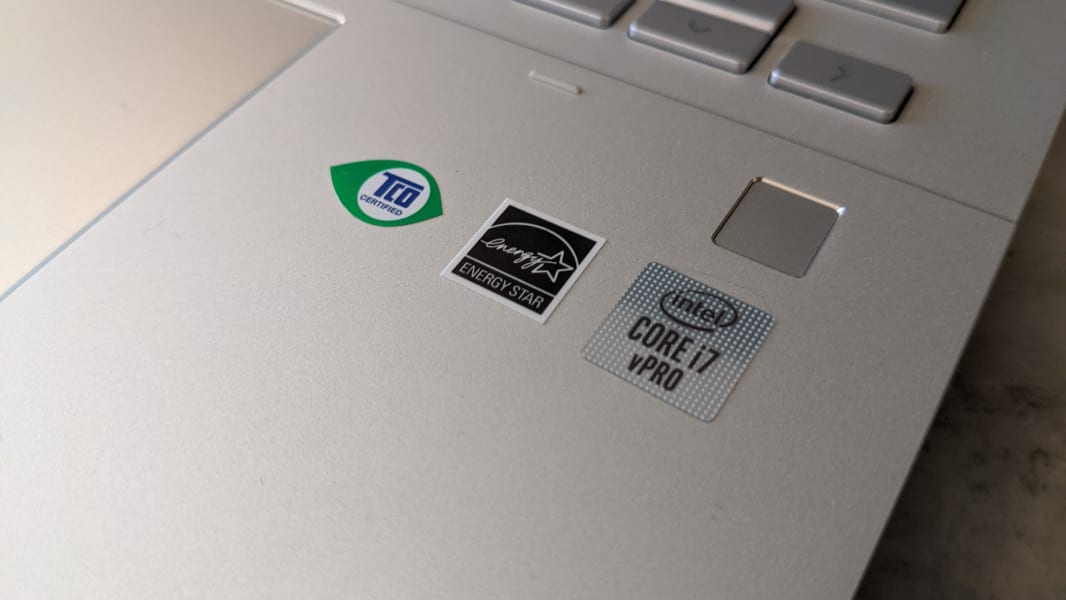
Put simply, both are damned good PCs. That happen to run Chrome OS, which may be a benefit or a problem, depending on your perspective.
For me, I still find Chrome OS limiting, but I feel like I could make some workflow adjustments with regards to how I access OneDrive-based documents, and make a few key app replacements, whether they’re web or mobile apps, and make this transition successfully. What’s holding me back is complicated, and perhaps multifaceted. I do happen to prefer Windows, of course, and I write books about Windows that require me to stick with real PCs. I write software as a sort of hobby, switching between Visual Studio Code (which is cross-platform) and Visual Studio (which is not), depending on what I’m doing. I do a lot of testing, and that sometimes requires virtual machines, and while there is at least one major tool on Chrome OS, Parallels Desktop, it’s currently very limited.
And … I don’t know. Chromebooks have always played an ancillary role in my life, and as the platform has evolved, I’ve kept expecting my final blockers to be slowly pushed aside. It’s getting there, but not quite for me. Not yet. But if I do ever make this shift, I will say that the Chromebook I end up with will be something very much like the two I’ve highlighted here today.